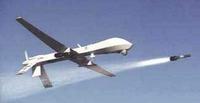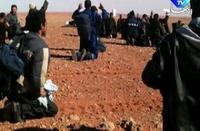-
Increasing the sensitivity of airport security screening
The latest episode in the American Chemical Society’s (ACS) Global Challenges/Chemistry Solutions podcast series reports a simple way to improve the sensitivity of the test often used to detect traces of explosives on the hands, carry-ons, and other possessions of passengers at airport security screening stations.
-
-
U.S. to build drone base in Niger

With the war in Mali raging, the U.S. Africa Command is now establishing a drone base in northwest Africa in order to bolster U.S. surveillance – and operational — capabilities against Islamist groups in the region. Initially, the drones flying from the base will conduct unarmed surveillance missions, but there is little doubt that if targets present themselves, these drones will be equipped with missiles and go on hunting-killing missions.
-
-
French forces push deep into north Mali, capture Gao

French military forces, supported by Malian forces, continue to push north into Islamist-controlled north Mali, and on Saturday captured the strategic city of Gao. French prime minister Jean-Marc Ayrault said that having chased the Islamists out of the Gao region, the French force was closing in on Timbuktu, north Mali’s main city. The initial phase of the military operation consists of liberating the large population centers of north Mali from Islamist control, and chasing the jihadists into the empty desert – and do so before the rainy season begins in March.
-
-
Clinton: U.S. must lead fight against “jihadist threat” in Africa

In what sounded at times as a valedictory address, Secretary of States Hillary Clinton offered a far-ranging and detailed discussion of the new threat the United States and the world are facing: the spread of Islamist influence and jihadist terrorism in Africa. Clinton told a Senate committee that al Qaeda and its affiliates in the region threaten African and European allies and pose a direct threat to the United States.
-
-
Blast-resilient carriages to reduce impact of a terrorist attack on trains, metros
Engineers have developed a blast-resilient carriages which are better able to withstand a terrorist attack and ultimately save lives. The engineers have e focused on two key areas — containing the impact of the blast and reducing debris — the main cause of death and injury in an explosion and the key obstacle for emergency services trying to gain access to injured passengers.
-
-
Russia begins unofficial evacuation of its citizens from Syria

Russia has been a staunch ally of the Assad regime for decades, and there are thousands of Russians in Syria. They are becoming increasingly vulnerable as the rebels are gaining on the Assad regime. Fearing that the anti-regime militias will begin to take revenge on Russians because of Russia’s association with Assad, Moscow on Tuesday began a quiet evacuation of Russians from Syria.
-
-
Pakistan bans two video games for depicting country as terrorist haven

A government-licensed trade organization in Pakistan has banned two popular video games because they depict Pakistan as a country soft on terrorism. A trade association order to member stores instructed that the games be removed off the shelves of video game stores.
-
-
Algeria: use of overwhelming force against hostage-takers was necessary
As the grim toll of the 4-day operation to wrest control of the Algerian gas drilling site becomes clearer, debate continues about the tactics the Algerian military pursued, which some in Western capitals consider rushed and heavy-handed. Algeria says it had no choice: the initial plan of the terrorists was to grab two-dozen foreign workers, take them to the nearby airport of Amena, hijack a plane, and fly them to Mali, then ask Western government for a hefty ransom. When that plan failed, the terrorists began preparations to blow up the entire complex, killing themselves and the 790 workers kept as prisoners on the site. Algeria says that if it did not act quickly, and with overwhelming force, the death toll would have been far higher.
-
-
Algerian hostage drama over; 48 hostages, 32 terrorists dead

Algerian forces have taken control of the gas drilling site near the Algeria-Libya border, and the authorities are trying to determine the human toll of the 4-day drama. Initial estimates indicate that forty-eight hostages and thirty-two terrorists have died in the fire exchanges between the hostage takers and the Algerian military. The Algerian government says that five of the Islamist terrorists were captured alive. The forty Islamist hostage-takers came from six different countries, and trained for the operation in a base in Islamist-controlled north Mali.
-
-
French defense minister: campaign goal is “total reconquest” of Mali
French fighter planes continued their attacks on training bases, weapon storage sites, and Islamist troop concentrations in north Mali, paying special attention the Islamists presence in and around the major cities of Gao and Timbuktu.
-
-
Many hostages dead in clumsy Algerian raid on gas drilling site
Sketchy news from the Sahara desert gas field site indicates that up to thirty hostages may have been killed by their Islamic captors as Algerian special forces attacked the site. Algerian officials said that the thirty dead included eight Algerians, two Britons, two Japanese, and one French national. The nationality of the other seventeen hostages killed at the site had not been established. The British government more openly, and the French and U.S. governments more elliptically, raised questions about the tactics used by the Algerian military: Algerian helicopter gunships strafed the living quarters at the site when both hostages and terrorists were inside; helicopters also destroyed four jeeps carrying both jihadists and hostages. It appears that most of the hostages were killed by Algerian fire, not by the terrorists.
-
-
Metamaterial sensor improves security, collision avoidance

Engineers have developed a novel sensor which is more efficient, versatile, and cheaper for potential use in such applications as airport security scanners and collision avoidance systems for aircraft, cars, or maritime vessels.
-
-
American Taliban wins court fight to allow Muslims group prayer in prison

John Walker Lindh, an American who joined the Taliban forces in Afghanistan, has won a legal fight which will allow him and his fellow Muslim inmates to gather for their daily prayers. The judge said that by not allowing Muslim prisoners group prayers, but allowing other activities such as board or card games, the warden was violating the Religious Freedom Restoration Act.
-
-
French air strikes begin campaign to evict Islamists from Mali

France sent its planes to bomb al Qaeda-affiliated Islamist groups in Mali after hundreds of members of these groups began to move from the north-east portion of Mali, which they have controlled since last April, down south, into the remaining part of Mali. French fighter jets have pounded insurgent training camps, arms and oil depots as the French defense ministry confirmed reports of dozens of Islamist deaths. Islamist militants were fleeing Timbuktu, Gao, and other towns in northern Mali. A coalition of Western African countries is sending the 1,000 troops to Mali today – soon to be followed by 2,300 more – to begin ground operations against the Islamists. France has asked the United States for surveillance drones to help track the fleeing Islamic militants.
-
-
Neutralizing the effects of lethal chemical agents
Organophosphorus agents (OPs) are used both in farm pesticides, and by terrorists and rogue states. About 200,000 people die each year across the world from organophosphorus agents (OP) poisoning, through occupational exposure, unintentional use, and misuse, mostly in developing countries like India, Pakistan, and Sri Lanka and through deliberate terrorist activities. OPs include compounds like Tabun, which was developed in 1936 by German scientists during the Second World War, Sarin, Soman, Cyclosarin, VX, and VR. Researchers develop an enzyme treatment which could neutralize the effects of OPs.
-
More headlines
The long view
What Does Netflix’s Drama “Adolescence” Tell Us About Incels and the Manosphere?
By Lewys Brace
While Netflix’s psychological crime drama ‘Adolescence’ is a work of fiction, its themes offer insight into the very real and troubling rise of the incel and manosphere culture online.
